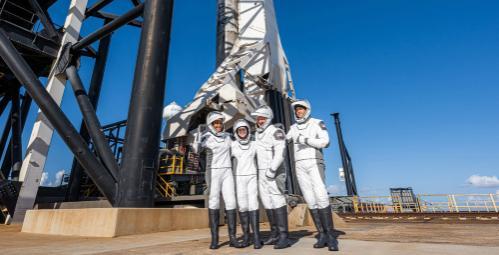 In the largest coordinated release of space biology discoveries in history, UCD joins over 100 institutions from more than 25 countries who worked together within the Nature Portfolio package: The Second Space Age: Omics, Platforms and Medicine across Space Orbits. This includes analysis of samples collected from the first all-civilian crew of the Inspiration4 mission.
In the largest coordinated release of space biology discoveries in history, UCD joins over 100 institutions from more than 25 countries who worked together within the Nature Portfolio package: The Second Space Age: Omics, Platforms and Medicine across Space Orbits. This includes analysis of samples collected from the first all-civilian crew of the Inspiration4 mission.
As part of the package, Ad Astra fellow Dr Nicholas Brereton, who leads the UCD Space Life Sciences team within UCD School of Biology and Environmental Sciences and is part of the UCD Centre for Space Science, collaborated with researchers from Weill Cornell Medicine, Harvard Medicine, California Institute of Technology, and NASA Ames to explore the effects of spaceflight on the human microbiome.
The findings, published in Nature Microbiology, report modulation of the microbiome across 750 samples and 10 body sites during the SpaceX Inspiration4 mission—the first all-civilian commercial flight to space—identifying persistent shifts underlying immune changes in astronauts.
Dr Brereton worked on the multiomics analyses and interpretation of astronaut microbiome data for this research. Multiomics combines diverse types of modern genetics, particularly powerful for understanding interactions between multiple organisms.
 Dr Brereton explained: “We know that space is an incredibly challenging environment for life. This research establishes a critical baseline for the future of aerospace medicine, capturing complex microbiome changes essential to human health. Importantly, due to the extremity of the environment, this knowledge not only aids our return to the moon but also reveals new interactions and research avenues that can drive medical discoveries on Earth.”
Dr Brereton explained: “We know that space is an incredibly challenging environment for life. This research establishes a critical baseline for the future of aerospace medicine, capturing complex microbiome changes essential to human health. Importantly, due to the extremity of the environment, this knowledge not only aids our return to the moon but also reveals new interactions and research avenues that can drive medical discoveries on Earth.”
He continued: “We currently have ongoing projects in collaboration with, or supported by, the European and Canadian Space Agencies and NASA, building on leading Irish expertise in advanced agriculture and radiotherapy. There are over 90 companies in Ireland’s emerging space sector, creating significant opportunities for the next generation of Irish space scientists. So it’s an exciting time for Irish space science.”
Visit Nature to read the The Second Space Age: Omics, Platforms and Medicine across Space Orbits package.